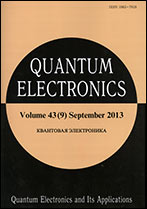|
This article is cited in 10 scientific papers (total in 10 papers)
Laser applications and other topics in quantum electronics
Inhomogeneity of the optical Magnus effect
B. Ya. Zel'dovich, I. V. Kataevskaya, N. D. Kundikova
Laboratory of Nonlinear Optics, Technical University, Chelyabinsk
Abstract:
An experimental investigation was made of the dependence of the angle of rotation of the speckle pattern of the radiation, transmitted by a fibre waveguide with a step refractive index profile, on the angle α of entry of a narrow light beam into the fibre. The magnitude of the optical Magnus effect depended on this angle as α2.
Received: 01.01.1996
Citation:
B. Ya. Zel'dovich, I. V. Kataevskaya, N. D. Kundikova, “Inhomogeneity of the optical Magnus effect”, Kvantovaya Elektronika, 23:1 (1996), 89–90 [Quantum Electron., 26:1 (1996), 87–88]
Linking options:
https://www.mathnet.ru/eng/qe595 https://www.mathnet.ru/eng/qe/v23/i1/p89
|


|





 Contact us:
Contact us: Terms of Use
Terms of Use
 Registration to the website
Registration to the website Logotypes
Logotypes









